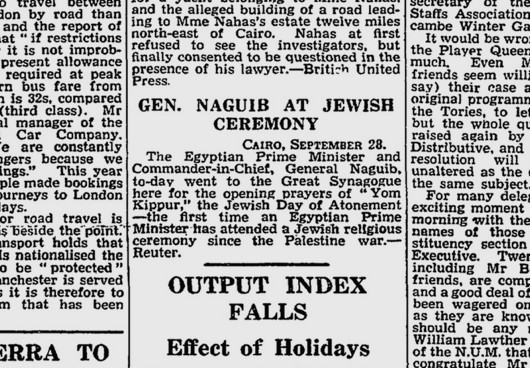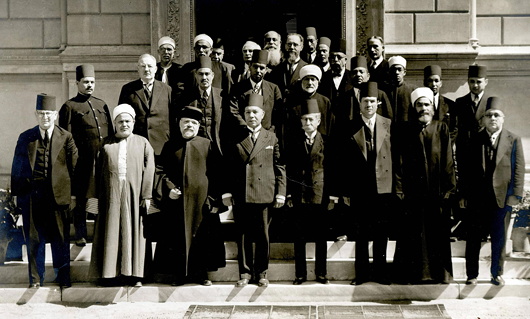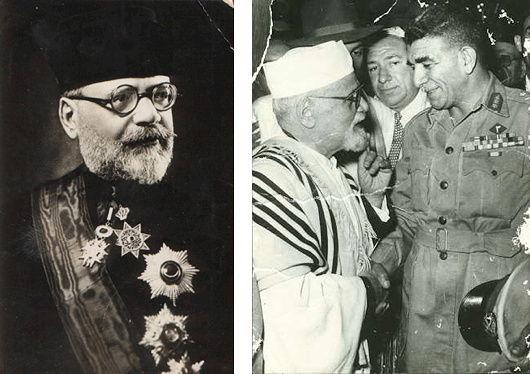
About Andrew Cusack
 Writer, web designer, etc.; born in New York; educated in Argentina, Scotland, and South Africa; now based in London.
Writer, web designer, etc.; born in New York; educated in Argentina, Scotland, and South Africa; now based in London. read more
News
Blogs
Reviews & Periodicals
Arts & Design
World
France
Mitteleuropa
Knickerbockers
Argentina
The Levant
Africa
Cape of Good Hope
Netherlands
Scandinavia
Québec
India
Muscovy
Germany
Academica
Nahum Effendi and Cairo’s Lost World

Stumbling across the newspaper clipping above was a sad reminder of a lost world. Taken from the front page of the Manchester Guardian of Monday 29 September 1952, it describes the Egyptian leader General Naguib attending a Yom Kippur service just two months after the coup that overthrew the country’s monarchy. None of the Jewish places of worship in Cairo are known as the “Great Synagogue”, so I presume this must have been the Adly Street Synagogue (Sha’ar Hashamayim).
The Chief Rabbi of the Sephardic community in Egypt at the time would have been Senator Rabbi Chaim Nahum Effendi. A creature of the Ottoman world, Rabbi Nahum was born in Smyrna in Anatolia, went to yeshiva in Tiberias on the Sea of Galilee, and finished his secondary education in a French lycée.
After earning a degree in Islamic law in Constantinople, he started his rabbinic studies in Paris while also studying at the Sorbonne’s School of Oriental Languages. Returning to Anatolia he was appointed the Hakham Bashi, or Chief Rabbi, of the Ottoman empire in 1908 and honoured with the title of effendi.
After that empire collapsed, Rabbi Nahum was invited to take up the helm of the Sephardic community in Egypt in 1923. A natural linguist and a gifted scholar, the chief rabbi’s talents were apparent to all, and he was appointed to the Egyptian senate as well as being a founding member of the Royal Academy of the Arabic Language created to standardise Egyptian Arabic.

Rabbi Nahum (front row, third from left) at the foundation of Egypt’s Arabic academy.
The foundation of the State of Israel was a godsend for many Jews but spelled the beginning of the end for Egypt’s community. Zionists were a distinct minority among Egyptian Jews — many of whom were part of Egypt’s (primarily anti-British) nationalist movement — but Israel’s defeat of the Arab League in the 1948 War embarrassed Egypt’s ruling classes and stoked anti-semitism amongst the populace. Violent attacks against Jewish businesses were tolerated by the authorities and went uninvestigated by the police. Unfounded allegations of both Zionism and treason were rife, and discriminatory employment laws were introduced.
The 1952 Revolution did not improve things, as the tolerant but decaying monarchy was replaced by a vigorous but nationalist and pan-Arabist military government. Faced with such continuing depredations, the overwhelming majority of Jewish Egyptians fled — to Israel, Europe, and the United States. Rabbi Nahum eventually died in 1960, by then something of a broken man I imagine.
Cairo was once a thriving cosmopolitan city of Muslims, Christians, and Jews — and many communities of outside origin. The Greeks, who first arrived twenty-seven centuries ago and in 1940 still numbered tens of thousands, have all left. The futurist Marinetti was the most famous of the Italian Egyptians, whose numbers in the 1930s were numerous enough to warrant several branches of the Fascist party. Since the 1952 Revolution they are all gone too. Some Armenians remain, but not many. As for Jews, there are six left in Egypt.
Sic transit gloria mundi.

Search
Instagram: @andcusack
Click here for my Instagram photos.Most Recent Posts
- Patrick in Parliament March 18, 2024
- Articles of Note: 13 March 2024 March 13, 2024
- Cambridge March 9, 2024
- Taken on Trust March 4, 2024
- Immanuel on the Green March 2, 2024
Most Recent Comments
Book Wishlist
Monthly Archives
Categories



Thank you for a most interesting article.The Adly Street synagogue (Sha’ar Hashamayim Hebrew for “Gates of Heaven”)in Cairo still exists and was renovated not too long ago.It is a masterpiece of early twentieth century synagogue architecture and is one of the finest buildings of modern Cairo.Unfortunately it is something of a museum-piece today due to the almost complete absence of Jews in Egypt.
Thank you for a most interesting article.The Adly Street synagogue (Sha’ar Hashamayim – Hebrew for “Gates of Heaven”)in Cairo still exists and was renovated not too long ago.It is a masterpiece of early twentieth century synagogue architecture and is one of the finest buildings of modern Cairo.Unfortunately it is something of a museum-piece today due to the almost complete absence of Jews in Egypt.
By the way the splendid synagogue in Alexandria (another museum-piece) is going to be restored shortly at the expense of the Egyptian Government I believe.
The reign of king Farouq was by no means perfect. However, unlike his predecessors he spoke Arabic, was actually popular with the masses and was fairly ‘cosmopolitan’ in outlook. That his rule was ‘subverted’ by British meddling and negative propaganda as well as the support given by the US to the anti-monarchist Nasser-Sadât faction in the army is without doubt. Both wished him replaced for their particular strategic interests and both ended up with a régime inimical to those interests.
The ageing Muhammad Neguib was just putty in Nasser’s hot hands.
As to restoration projects cited above, in Egypt ‘shortly’ may be counted in decades. The classically columned Greco-Roman museum has been closed for renovation since 2005. What’s a decade in a culture measured in millennia.